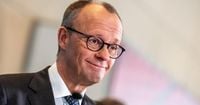In a significant political shift, the CDU and CSU have unveiled their new cabinet, marking a pivotal moment in German governance. Led by CDU leader Friedrich Merz, the cabinet comprises 17 ministers, with the CDU contributing seven members and the CSU three, reflecting a coalition agreement that aims to balance power between the two parties.
Among the notable appointments is Karsten Wildberger, the CEO of Ceconomy, who will take charge of the newly established Ministry of Digitalization and State Modernization. This appointment signals a strong emphasis on digital transformation within the government, as Wildberger brings extensive experience from the corporate sector, having previously managed major companies like MediaMarkt and E.ON.
Katherina Reiche, a former CDU member of the Bundestag and a prominent figure from East Germany, has been appointed as the Minister of Economy and Energy. Her selection is particularly historic, as she becomes the first woman from East Germany to hold this position. Reiche's background as a chemical engineer and her previous roles in environmental and transport ministries position her well to tackle the challenges of the economic sector.
The Foreign Office will be led by Johann Wadephul, a seasoned politician from Schleswig-Holstein, who has been a member of the Bundestag since 2009. Wadephul is expected to leverage his expertise in foreign and security policy to navigate Germany's international relations.
Other key appointments include Alexander Dobrindt, who will serve as the Minister of the Interior, and Nina Warken, who has been designated as the Minister of Health. Warken's appointment comes as a surprise, given her prior involvement in the working group on internal affairs during coalition negotiations.
Thorsten Frei, a close ally of Merz, will head the Chancellery, overseeing the coordination of government policies and ensuring a smooth operation within the cabinet. Frei's legal background and experience in local governance are expected to play a crucial role in his new responsibilities.
Karin Prien, recognized for her strong stance on education policy, will lead the Ministry of Education, Family, Seniors, Women, and Youth. Her tenure as the Minister of Education in Schleswig-Holstein has prepared her for this expanded role.
Alois Rainer, a former butcher and Bundestag member since 2013, will take on the role of Minister of Agriculture, aiming to bring a pragmatic perspective to agricultural policies. His appointment has drawn attention, particularly in light of his predecessor's more plant-based approach to agriculture.
Dorothee Bär, who previously served as the government's digitalization commissioner, will now oversee the Ministry of Research, Technology, and Aerospace. Her experience in digital policy will be crucial as Germany looks to advance its technological capabilities.
In the Chancellery, Wolfram Weimer has been appointed as the State Minister for Culture and Media, while Christiane Schenderlein will serve as the State Minister for Sports and Volunteer Work. Schenderlein's role is particularly significant as sports organizations have long advocated for a dedicated ministerial position to better address their needs within the government.
Michael Meister will handle Federal-State Cooperation, ensuring collaboration between various levels of government. This is a vital role as Germany continues to face challenges that require coordinated responses across federal and state lines.
As for the parliamentary state secretaries, Gitta Connemann and Stefan Rouenhoff will serve in the Ministry of Economics, while Philipp Amthor and Thomas Jarzombek will take roles in the Ministry of Digitalization. Georg Kippels and Tino Sorge will also join the Health Ministry, with Mareike Wulf and Michael Brand assisting in the Education Ministry. Christian Hirte will be the State Secretary for Transport, while Christoph de Vries and Silvia Breher will support the Ministry of the Interior and Agriculture, respectively.
During the presentation of the new cabinet members, CDU General Secretary Carsten Linnemann emphasized the party's commitment to maintaining its independent voice within the coalition. "The CDU will not become an outside office of the Federal Chancellery," he stated, highlighting the importance of the party's autonomy in shaping policy direction.
The SPD is expected to announce its cabinet members shortly, with speculation surrounding potential candidates for key ministries such as Finance and Defense. The SPD's selections will complement the CDU and CSU's appointments, shaping the future direction of the German government.
Friedrich Merz is scheduled to be elected Chancellor by the Bundestag on May 6, 2025, marking a new chapter in German politics. As the coalition takes shape, all eyes will be on how these newly appointed ministers will address pressing issues such as economic recovery, digital transformation, and social welfare.
With the CDU and CSU now firmly in control of the cabinet, the coalition's effectiveness will depend on its ability to navigate internal dynamics and present a united front in tackling the challenges facing Germany in the coming years.





